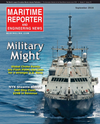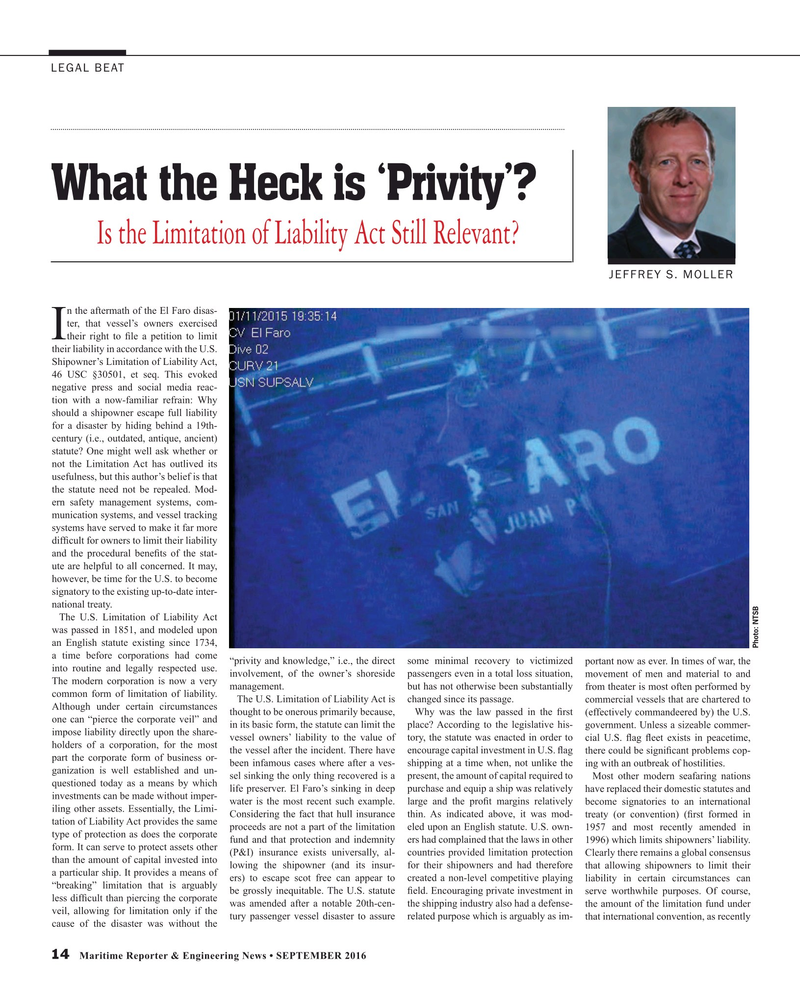
Page 14: of Maritime Reporter Magazine (September 2016)
Maritime & Ship Security
Read this page in Pdf, Flash or Html5 edition of September 2016 Maritime Reporter Magazine
LEGAL BEAT
What the Heck is ‘Privity’?
Is the Limitation of Liability Act Still Relevant?
JEFFREY S. MOLLER n the aftermath of the El Faro disas- ter, that vessel’s owners exercised
Itheir right to ? le a petition to limit their liability in accordance with the U.S.
Shipowner’s Limitation of Liability Act, 46 USC §30501, et seq. This evoked negative press and social media reac- tion with a now-familiar refrain: Why should a shipowner escape full liability for a disaster by hiding behind a 19th- century (i.e., outdated, antique, ancient) statute? One might well ask whether or not the Limitation Act has outlived its usefulness, but this author’s belief is that the statute need not be repealed. Mod- ern safety management systems, com- munication systems, and vessel tracking systems have served to make it far more dif? cult for owners to limit their liability and the procedural bene? ts of the stat- ute are helpful to all concerned. It may, however, be time for the U.S. to become signatory to the existing up-to-date inter- national treaty.
The U.S. Limitation of Liability Act was passed in 1851, and modeled upon an English statute existing since 1734,
Photo: NTSB a time before corporations had come “privity and knowledge,” i.e., the direct some minimal recovery to victimized portant now as ever. In times of war, the into routine and legally respected use. involvement, of the owner’s shoreside passengers even in a total loss situation, movement of men and material to and
The modern corporation is now a very management. but has not otherwise been substantially from theater is most often performed by common form of limitation of liability.
The U.S. Limitation of Liability Act is changed since its passage. commercial vessels that are chartered to
Although under certain circumstances thought to be onerous primarily because, Why was the law passed in the ? rst (effectively commandeered by) the U.S. one can “pierce the corporate veil” and in its basic form, the statute can limit the place? According to the legislative his- government. Unless a sizeable commer- impose liability directly upon the share- vessel owners’ liability to the value of tory, the statute was enacted in order to cial U.S. ? ag ? eet exists in peacetime, holders of a corporation, for the most the vessel after the incident. There have encourage capital investment in U.S. ? ag there could be signi? cant problems cop- part the corporate form of business or- been infamous cases where after a ves- shipping at a time when, not unlike the ing with an outbreak of hostilities. ganization is well established and un- sel sinking the only thing recovered is a present, the amount of capital required to Most other modern seafaring nations questioned today as a means by which life preserver. El Faro’s sinking in deep purchase and equip a ship was relatively have replaced their domestic statutes and investments can be made without imper- water is the most recent such example. large and the pro? t margins relatively become signatories to an international iling other assets. Essentially, the Limi-
Considering the fact that hull insurance thin. As indicated above, it was mod- treaty (or convention) (? rst formed in tation of Liability Act provides the same proceeds are not a part of the limitation eled upon an English statute. U.S. own- 1957 and most recently amended in type of protection as does the corporate fund and that protection and indemnity ers had complained that the laws in other 1996) which limits shipowners’ liability. form. It can serve to protect assets other (P&I) insurance exists universally, al- countries provided limitation protection Clearly there remains a global consensus than the amount of capital invested into lowing the shipowner (and its insur- for their shipowners and had therefore that allowing shipowners to limit their a particular ship. It provides a means of “breaking” limitation that is arguably ers) to escape scot free can appear to created a non-level competitive playing liability in certain circumstances can be grossly inequitable. The U.S. statute ? eld. Encouraging private investment in serve worthwhile purposes. Of course, less dif? cult than piercing the corporate was amended after a notable 20th-cen- the shipping industry also had a defense- the amount of the limitation fund under veil, allowing for limitation only if the tury passenger vessel disaster to assure related purpose which is arguably as im- that international convention, as recently cause of the disaster was without the 14 Maritime Reporter & Engineering News • SEPTEMBER 2016
MR #9 (10-17).indd 14 9/2/2016 10:12:19 AM

 13
13

 15
15
